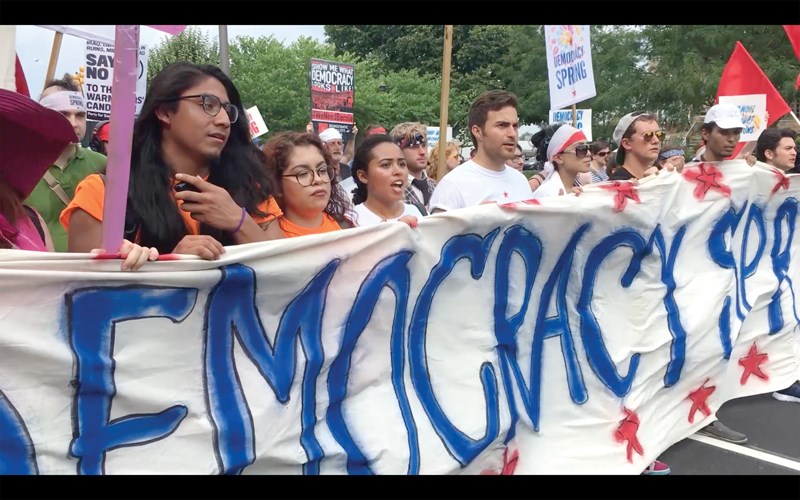DOXA Film Festival: Tumped! Now What! For complete schedule visit doxafestival.ca.
People die young in McDowell County.
It’s West Virginia coal country but they don’t mine much coal anymore.
The men live to be 64, about 12 years off the national average. The women do better, but not much.
And, as we see in Waking the Sleeping Giant, things are getting worse.
That county, where Donald Trump trounced Hillary Clinton by better than three-to-one, is the jumping off point for Trumped! What the $%*%(!! Now? a series of three movies picked for DOXA by founding Tyee editor David Beers.
Waking the Sleeping Giant opens with Bernie Sanders delivering a message of hope that reads like a dead letter. For liberals, seeing Sanders at the outset of the Democratic primaries is like watching Evel Knievel before the rocket falls into Snake River Canyon.
There was a mood in the country, Beers explains, a “something’s-gotta-give” mood, and with Hillary Clinton cast as an agent for the status quo, Sanders’ failure allowed Trump’s rise.
“Once fear and insecurity rise to a certain level within the populace, that fear and insecurity is easily manipulated,” he says. “But it can also be channeled into a more hopeful and dare I say radical vision.”
That radical vision is on display in McDowell County as Sabrina Shrader runs for West Virginia’s House of Delegates.
She’s a real-life Mr. Smith Goes to Washington, pointing to the immense chasm between the governed and the government. It’s not so far from West Virginia to Washington, D.C., but in terms of experience the capital may as well be 3,000 miles away.
“We’re trusting the people that have no clue what we go through to make decisions for us,” she says.
Trump’s shadow hangs over the movie like atmospheric pressure. We don’t see him but we feel his presence as we follow Shrader, Sanders, a Black Lives Matter activist, and protesters who want to take money out of politics.
We see Sanders supporters chanting, “Hell no, DNC, we won’t vote for Hillary!” in protest of Clinton’s victory, but the movie never touches the issue of whether or not Sanders was cheated.
Instead, it’s more concerned with the outcry, and “all the different threads that would have to be woven into a tapestry of resistance,” Beers says.
On the other side of the aisle we have PACmen, which chronicles the doomed presidential run of Dr. Ben Carson from the inside.
His backers knew the Americans wanted an outsider, “But they bet on the wrong horse,” Beers says.
The movie proceeds like a lesson in the cruelty of fate as his supporters raise millions, contribute hundreds of hours of their time, and then feel the rope they’re clutching turn to sand.
Carson suggests arming kindergarten teachers, that the Chinese are in the Middle East, Joseph built the great pyramids of Egypt to store grain and that the victims of a school shooting should have attacked the shooter. But there’s more: Carson has something to say about Hamas. Unfortunately, no one can hear it because of the way he pronounces the word, which is awfully close to hummus.
“This is not going to be easy to get him to win. In part because he keeps talking,” supporter John Philip Sousa IV tells a crowd, eliciting an easy laugh. “I’m not kidding,” he adds.
Carson’s Super PAC supporters look like Gordon Gecko gone pious trying to pray their way out of a crash that’ll wipe out their one can’t-miss blue chip stock.
PACmen also shows us just how thick and tall the walls of a political silo can be. His supporters cheer Carson during a debate and then turn the TV to mute as they pray while his suddenly-silent opponents reply.
It’s not anger that motivated Carson’s Christian supporters according to Beers. It’s fear.
“They’re fearful, literally, for the fate of civilization. They feel that God’s wrath is imminent,” he says.
But in Ada for Mayor we see a different kind of fear: an immediate, heart-stopping terror as the door of a woman’s apartment is reduced to splinters. She’s being renovicted.
“That’s somebody we can relate to here in Vancouver,” Beers notes.
The movie follows Ada Colau as she tries to unite disparate political factions to support her city’s endangered renters.
“It’s fine to Facebook your opinions and sign petitions but at some point you have to get in a room and you have to hammer out a political framework that people can agree on and get behind,” Beers says. “This is a nuts and bolts account of how that was done in Barcelona.”
And while Barcelona, Ben Carson and McDowell County can all seem a long way from Canada, Beers notes that the issues they represent are like objects in the rearview mirror: closer than they appear.
“Canadians like to think Americans are from Venus and we’re from Mars,” Beers says. “At a minimum, the two planets sometimes orbit so closely to each other that they exert a powerful gravitational pull.”
Trump’s populist backlash isn’t entirely different from the “we need to clean house” urgency of Preston Manning’s Reform Party of Canada, he argues.
“That sagebrush rebellion moment actually happened in Canada ahead of the U.S. But it just didn’t have that crazy, reality TV, carnival barker, Donald Trump feel to it.”
The films are meant to be a bulwark against despair, according to Beers.
“Trumpism,” he writes in an essay accompanying the films, “can be repealed and replaced in Washington, in your town, in an angry, hurting heart.



